Necessary Tools For Graphic Designers
As with any line of work, specific tools are essential for getting work done efficiently and effectively. But, it can be hard to know which programs are helpful.
This list of the best graphic design tools showcases the best hardware, software, and other essential equipment for graphic designers.
I've been a graphic designer for many years and even studied graphic design at university. I currently run my own successful freelance business, where I offer graphic design as my main service. It's one of the best online jobs out there.
I've tried and tested most of the graphic design equipment and tools on this list myself and am here to share my thoughts on these products with you — many of which are free!
Here are the 15 best tools for graphic designers.
Best Hardware for Graphic Designers
First up: the best hardware-related graphic design tools. Without these, you won't even be able to run the software needed to complete your projects on time.
1. Laptop – MacBook Pro
One of the joys of being a freelancer is that you can work from absolutely anywhere. That's why a lot of digital nomads are freelancers. You can work from your favourite coffee shop, your home, or even seaside in Mexico!
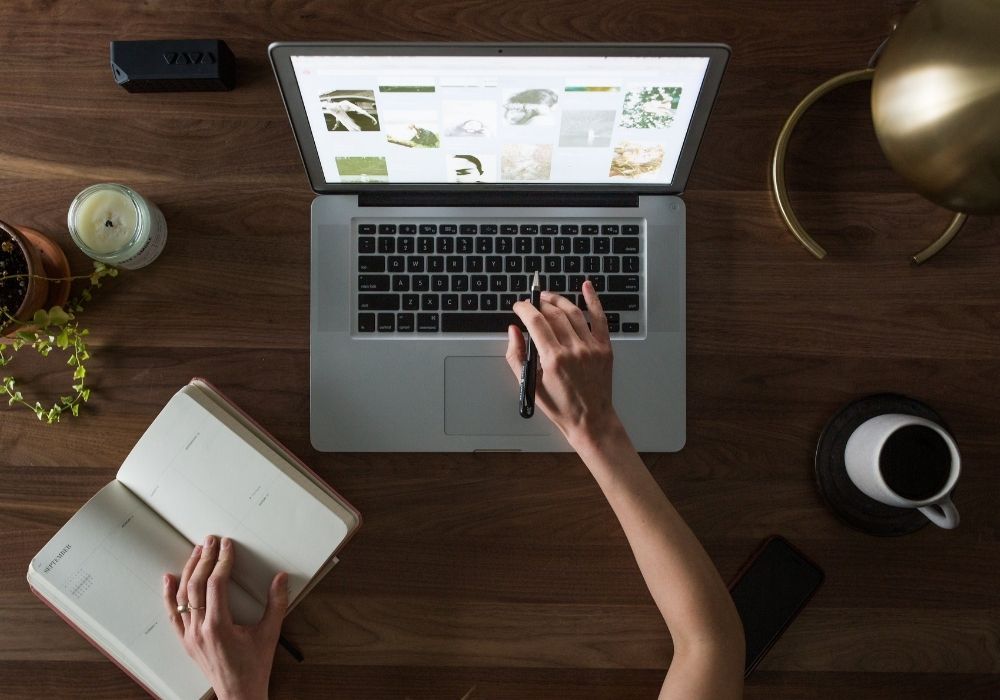
Because of that, you have to make sure you have a computer that can keep up with your lifestyle and handle all the programs you'll be running.
With graphic design, those programs can be hefty and can cause many cheaper laptops to fail miserably.
I started as a graphic designer using Windows over eight years ago, and that changed quickly.
I soon realized that Windows computers weren't going to help me get work done as efficiently as possible because they didn't work as well with Adobe Creative Cloud, which I use every day.
A MacBook Pro is one of the essential graphic design tools because it can handle the power of running multiple Adobe programs at once without crashing.
I'm not here to tell you that you need to purchase the most expensive version, because you don't. I have the cheapest MacBook Pro from 2018, and I'm still going strong.
2. External Hard Drive
While using tools like Dropbox and Google Drive are great for staying organized, it can be hard to keep working files as a designer in cloud programs like these. That's where external hard drives come in.
If you take good care of your external hard drive, it can be a one-time purchase for life. I personally use the hard drive line from Seagate and haven't had a problem once. They can be purchased on Amazon for around $50 USD.
When buying an external hard drive, you absolutely must purchase a hard shock-proof case to keep it safe. This is even more essential if you'll be travelling with it. If your hard drive gets bumped the wrong way or falls, it can fail, and you'll lose everything.
Keep in mind that different brands make external hard drives for different types of computers (i.e. Windows versus Mac), so make sure you purchase the one that is right for your computer.
3. Mirrorless Camera
One of the top things that most graphic designers also dabble in is photography, which is why it's essential to have a camera on hand.
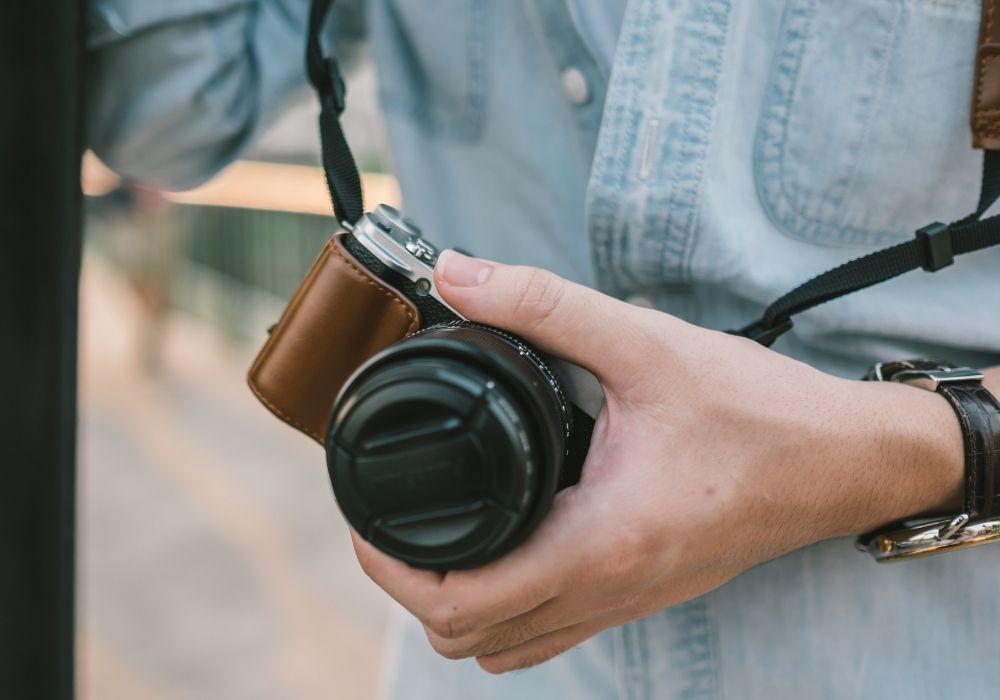
Whether you're designing a poster for a product and you need to take some product photography for it, or you're just taking pictures of your work for your portfolio on your website, a good camera is a must.
While DSLR cameras are great, mirrorless cameras are a lot lighter, which is why I prefer them. As a designer, you don't need to purchase one of the most expensive cameras around, so purchase one in your budget.
Some of my favourites include the Canon EOS M50 and the Canon EOS M100. These both go for around $500 to $600 USD, but you can purchase them in bundles on Amazon and get a lot more for your money!
4. Apple iPad
I'll be honest; I went years without purchasing my own Apple iPad and consistently rented it out from my university.
After graduating, I realized it was pertinent to own one. No matter the size, an Apple iPad is one of the best tools for graphic designers without a doubt.
There are many apps for graphic designers on the iPad, ranging from Procreate for illustration to Lightroom for quick photo edits if you're designing something editorial.
Switching from illustrating on the computer using Adobe Illustrator to quickly sketching something in more detail on Procreate is a huge timesaver and can do wonders for your work.
There is a wide range of sizes available for the Apple iPad, and unless you know you'll be doing enormous illustrations for your work, you can get away with purchasing the Mini.
Just make sure that whatever you are buying is compatible with the Apple Pencil, which is essential for designers.
5. Desktop: iMac
While a laptop is essential graphic design equipment, so is a desktop computer of some sort.
Being a graphic designer can be pricy if you're just starting in this career, but once you have all the equipment, this line of work can be lucrative — which will help you pay back your investment in these important tools.
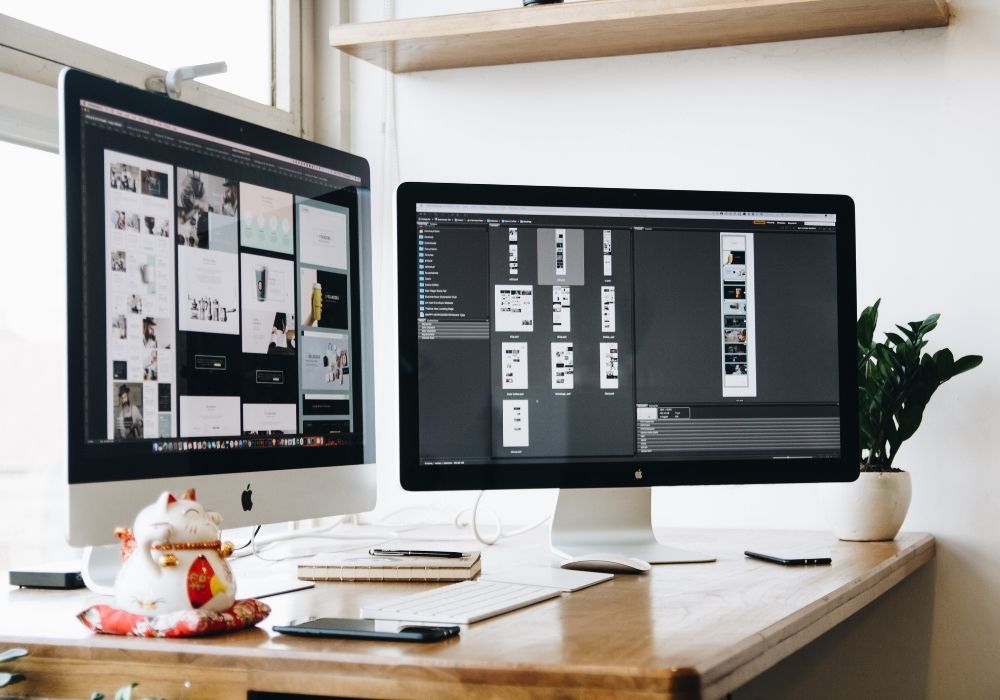
Having a desktop computer will come in handy if you know you'll be working from home a lot. It is also excellent for projects with lots of detail because the screen size is a lot larger than a laptop.
There are tons of different desktop computers out there, but similar to the laptop on this list, Apple products work best with Adobe Creative Cloud. As a graphic designer, having equipment that works seamlessly with the software you frequently use is essential.
Apple has a wide range of different desktops, but you don't have to get roped into purchasing the most expensive one with tons of features you won't even bother using.
I have the 21.5-inch iMac with Retina 4K Display, and I find that it works perfectly for what I need. Plus, it was cheaper than my laptop.
Software Tools for Graphic Designers
Now that you have the hardware, it's time to start investing in software. If you purchased the best hardware for the software you know you'll be consistently using, then your job will become a lot easier.
6. Adobe Creative Cloud
Out of all the essential tools for graphic designers on this list, Adobe Creative Cloud is one that should not be overlooked. What's a graphic designer without their software?
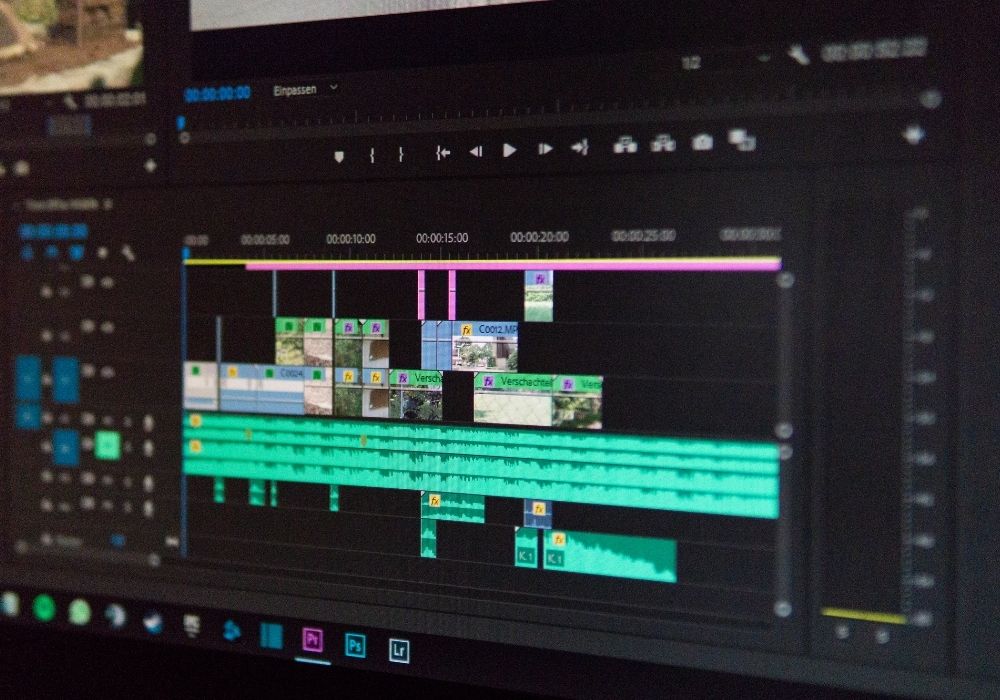
Within Adobe Creative Cloud, there's Illustrator, InDesign, Photoshop, Lightroom, XD, and more, which a graphic designer needs to do any of their projects.
Unfortunately, this software is not a one-time purchase like it used to be ten years ago.
Instead, it's a monthly or annual subscription that you have to pay for. I personally pay $50 USD per month, and my subscription has access to every possible Adobe application, including their online-only programs like Adobe Spark.
You can purchase access to just the Adobe software that you know you'll need, but because graphic designers get thrown so many curveballs, I suggest buying the all-inclusive subscription if you can afford it.
If you're currently a student, you can purchase access to everything for just $15 USD per month!
7. Canva
While Canva may seem like a bit of a cop-out by some graphic designers, I use it often in my own business and I'm not ashamed.
Sometimes, clients even prefer that you create something in Canva, especially templates because they already know how to use the program.
Canva has a free version, which you could get away with using. However, the paid plan is only $12 USD per month and is worth it because you'll also have access to Canva's wide variety of stock photos that you can use in client projects.Learn more about the plans available with Canva here.
While Canva isn't one of the best graphic design tools for print projects, it's great for digital designs.
This includes social media graphics, online PDFs, virtual advertisements, etc. Plus, Canva automatically uses the RGB colour space, so there is no extra work needed on your end.
If you're a designer who plans on selling templates, Canva can be essential to your business.
I've found that customers prefer purchasing templates for a platform they already use, and while Canva doesn't have as many design freedoms as Adobe, many people know how to use it.
☞ SEE ALSO: 15 Best Tools For Social Media Managers
8. Google Drive
There's no better place to store client-facing documents and projects than on Google Drive.
As mentioned when I discussed Canva, clients love using programs that they are already familiar with. Luckily, pretty much everyone uses a Google product at least once a day!
Not only is Google Drive great for storing projects and final files that you send to clients, but it's also a great place to collect assets from your clients as a designer.
Your client most likely already knows how to upload and share something with you, so it shouldn't even be that much work on your end.
This is one of the best graphic design tools, whether you use the free or paid version. I've been using it for about eight months, and I'm not even close to what's included storage-wise in the free version, so you won't have to upgrade for a while.
9. Dropbox
Google Drive can be great for sharing with clients, but I'm not too fond of it for storing my personal design backlog.
I always like to save final files for at least one year after a project has ended just in case an issue ever arises for the client. It's also good to keep these files so that you can create mockups for your portfolio so future clients can see what you're capable of.

Dropbox can easily be downloaded onto your computer as an app, which is why I much prefer it to Google Drive. It's essentially just like an extra folder on your computer, making it easy to upload files whenever necessary.
Dropbox also has its own word document, called a Paper Doc. You can create written documents, share notes with your team, and more using these. It's super easy!
Similar to Google Drive, you can get away with using the free version for a long time.
10. Figma
Figma is essentially a free version of Adobe Creative Cloud, yet I still find myself using it sometimes. It can be great for projects that you want to collaborate on because you can share a link with other designers to edit it online.
This software is perfect for projects that involve prototyping, like app or UX design. You can create actions so that a client can see exactly what were to happen if they click on something, for example.
This program helps to bring your projects to life.
A free version of Figma is available for up to three projects at a time, which I've found to work great for me and my projects whenever I need it. If you need more storage, you can switch to the $12 per month version.
Must-Have Equipment for Graphic Designers
Graphic designer equipment can be critical for comfort, physical health, and being productive while you're working. My business wouldn't be the same without all five of these!
11. Notebook
You may not realize it, but notebooks are one of the most essential tools for graphic designers.
While I love using my favourite apps like Goodnotes and Procreate, sometimes nothing can beat the ease and comfort of just writing on paper with a pen. This is one of the most overlooked pieces of equipment for graphic designers.
Notebooks are also extremely cheap.
You can purchase some in bulk on Amazon for as little as $10, or you can get fancy and show your personality by purchasing colourful versions too. Pay attention to back to school sales if you know you'll be needing a notebook for your business.
12. Sturdy Desk
Whether you're a graphic designer working from a laptop or a desktop computer, you'll need to have a desk or designated workspace. This is especially true for client meetings; it's not professional to take one while lounging out on your couch.
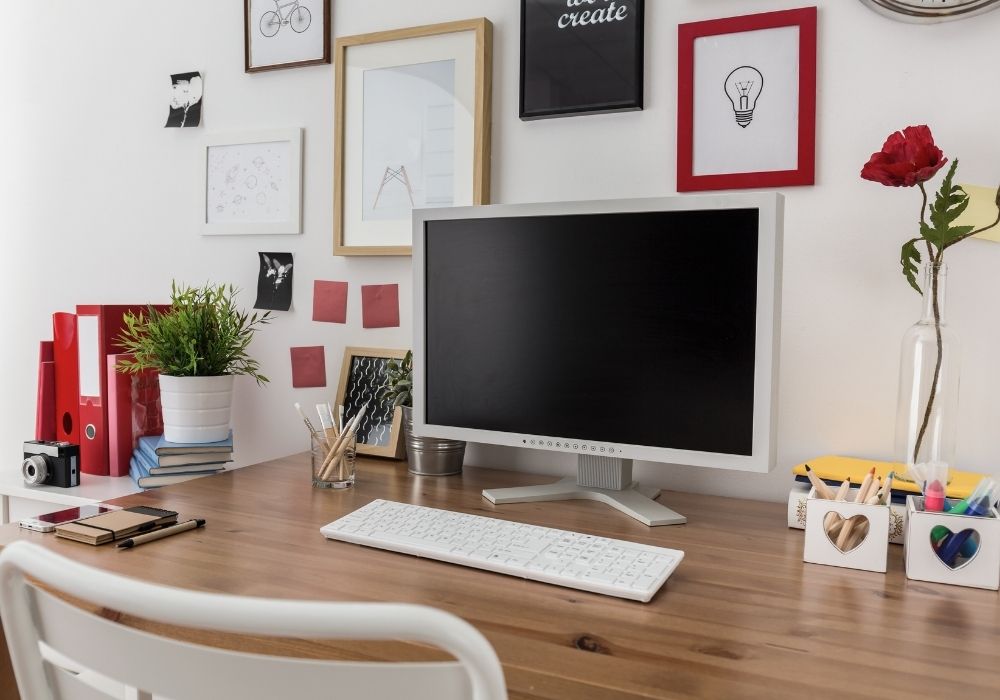
Desks can be purchased for really affordable prices, so there is sure to be one in your budget. If you want to build your own, that's possible too. I ended up purchasing my desk in parts from Ikea for around $100, and I use it every day.
Desks are one of the best tools for graphic designers that are often overlooked.
If you can't afford a desk, consider purchasing a small table that you can put somewhere in your house to have a designated workspace. While working from home, you need to find a work-life balance and having a designated workspace can help with that.
13. Comfortable Chair
No matter what type of freelancer you are, a comfortable chair is crucial. This is one piece of graphic design equipment that I don't recommend you cheap out on.
If you had told me a year ago that I'd own a $350 chair, I wouldn't have believed you. Yet, I was starting to get to the point where I was getting back pain from my $20 swivel chair that I had been using prior.
An ergonomic chair is one product that you'll definitely want to spend your money on.
You can usually find great deals for chairs at office supply stores, like Office Depot or Staples. Online stores like Wayfair or Overstock are also great places to look for a chair, as is Ikea.
14. Colored Markers or Pens
At their core, graphic designers are artists. While we usually focus on digital art, sketching something in colour on a pad of paper can often be quicker so that we don't forget some of our initial project ideas.
That's why markers or coloured pens are one of the best tools for graphic designers. You don't even need fancy ones; I use a mega pack of Crayola coloured markers that I purchased for around $8 at my local superstore.
Whenever I start a new project, I immediately grab my marker pack and start sketching initial ideas with colour. This helps so much later on when I'm beginning to digitize everything!
15. Headphones
Whether you're working from home, on the beach, or in a coworking space, headphones are must-have graphic designer equipment. They come in handy for taking private calls with clients and listening to music or podcasts while working.
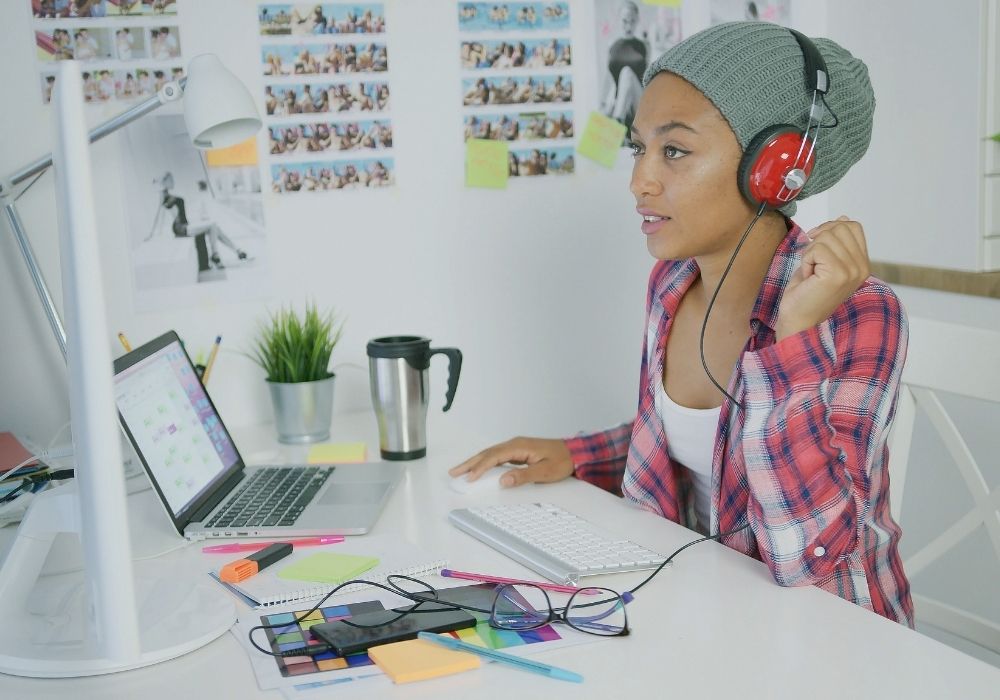
Headphones can help you get in the zone while working too.
Listening to your favourite album on noise-cancelling headphones can help graphic designers hyper-focus while working. This is one of my favourite tactics for getting work done in a reasonable amount of time.
There are tons of headphones out there, but my top pick is Studio wireless headphones from Beats. They cancel all types of noise and are wireless, so you don't get tangled up with anything, and it's near impossible to get distracted. For travel, Apple Airpods are great.
Now You Know The Best Graphic Design Tools
Now you know all of the best graphic design tools! Whether you are a freelancer or you work for a larger company, these tools are essential and can help you reach your potential.
Before you purchase any of the equipment on this list, make sure you take the time to cross-check prices as much as possible. You never know where you might be able to snag a deal.
Like This Article? Pin it!
Disclaimer:Goats On The Road is an Amazon Associate and also an affiliate for some other retailers. This means we earn commissions if you click links on our blog and purchase from those retailers.
Necessary Tools For Graphic Designers
Source: https://www.goatsontheroad.com/graphic-design-tools/
Posted by: hiserwarge1965.blogspot.com


0 Response to "Necessary Tools For Graphic Designers"
Post a Comment